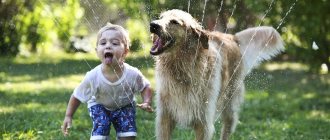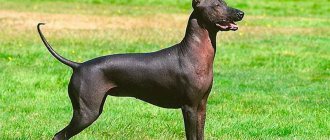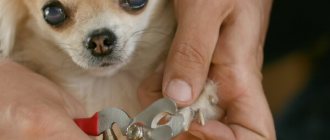The first exciting days when a puppy appears in a new home turn out to be too difficult for both the owners and the little creature recently weaned from its mother. Unfortunately, sometimes the plans of happy owners include concerns about the baby’s quality nutrition, timely visits to the veterinarian and vaccinations, well-groomed fur, but not about upbringing in the first days and weeks of being in an unusual environment. But early socialization of a puppy
– a kind of ticket to adulthood, practically a guarantee of excellent obedience and a strong nervous system for the dog in the future.
A socialized dog is one that is controlled by its owner (primarily), and not by its own instincts. This is an adequate animal, capable of remaining calm even in unexpected situations without unnecessary fear and aggression. In other words, adaptation to life in society is a necessity for a city dog, otherwise in the future the animal is unlikely to be trained, most likely will not get along with any of the domestic animals, in a street environment it will be afraid of loud noise and fuss, and on a walk on the platform will behave either overly depressed or cocky.
Of course, a puppy can have its own unique character, which, even in a very successful situation, will still make itself felt. However, in order for the dog to be manageable, it will require quite a lot of hard work and help from the owner. And at the initial stage of education, the main thing for a person is to behave correctly, not to overdo it with punishments or excessive affection. If a puppy’s first lessons after birth are given by his mother, then from about 2 months (usually it is at this age that puppies from a breeder find a new family) their main teacher is the owner.
The importance of socialization for a puppy
Since you take the puppy away from its mother, you become responsible for teaching it about daily life. During socialization, you gradually and carefully introduce your friend to various phenomena in everyday life, to things, sounds, different situations, etc. that are new to him.
Socialization is designed to help your dog successfully integrate not only into human society, but also into the society of the animals around it.
Consequences of little attention to socialization
How can a puppy grow up if left to its own devices? Perhaps he will become overly fearful, perhaps angry. It may also happen that at first glance there will be no visible consequences from the owner’s inattention to the adaptation process. However, in an unusual situation, such an animal is a time bomb. Here, unfortunately, we can remember unfortunate owners who get massive dogs (usually fighting ones), and their training for life among society means “training” on stray animals (and sometimes people), the absence of any restrictions (walking without a leash and a muzzle, because “the dog is kind”, etc.).
In fact, an animal without preparation for adult life actually goes crazy. It does not know how to behave on the street, is beyond the control of its owner in difficult times, and cannot suppress its instincts. And this is especially true for those dogs whose life is limited to the space of an apartment or a plot of garden (private) household. Those who do not receive live communication with their tailed brothers, who are deprived of games with the owner, who simply do not leave their home. In the end, those whose owners could not (or did not want) to find an approach to the animal, limiting themselves to only taking care of a filled bowl and caring for the fur, for example.
Problems of unsocialized puppies
Dogs that are not properly socialized when they are young often grow up to be fearful, unconfident dogs who don't know how to behave in the simplest of situations. As a result, being in constant stress, the dog gradually becomes aggressive, since this is the animal’s natural defensive reaction to events that are incomprehensible to it.
Other unsocialized puppies may grow into hyperactive, restless dogs who, due to their instability, will have severe behavioral problems. Such dogs will always pose a potential danger not only to other animals, but also to their owners.
Adult pets
Socialization of an adult dog (and most often we are talking about a pet found on the street or taken from a shelter) is called resocialization. It is quite difficult to carry it out alone. As a rule, owners of such dogs turn to dog handlers for help.
First of all, it is important to understand how the dog reacts to the street, other animals, and people. Depending on how difficult it is for her to perceive this or that information, the specialist will develop an appropriate training program. Socializing a dog from a shelter is a complex process; it requires a lot of patience, understanding and love from the owner.
At what age should socialization begin?
Socialization of a puppy usually begins immediately after its birth, when the mother begins to teach the puppies order in the pack and communication between dogs. The best age to begin human socialization of puppies is between 4 and 12 weeks. At this age they are most receptive to learning.
If you purchased your puppy from a professional breeder, then it is likely that they have already begun socializing your puppy to prepare them for their new owners in the best possible way. Therefore, always ask the breeder if he has started training the puppy and what he has already introduced him to. Once you pick up your puppy from the breeder, you will continue to train him.
Raising, socialization and training of dogs at different periods
Teaching a dog to communicate with the outside world is not an easy task, but it is quite doable. The upbringing, socialization and training of dogs varies from time to time. The most fruitful age for socialization of a young dog (puppy) is up to one year. If you miss this time, most likely, the dog will never learn to respond adequately to the environment and will bring you a lot of problems.
The life of a dog from birth to old age can be divided into eight periods.
From birth to three weeks. All vital processes of a dog’s body occur thanks to unconditioned reflexes. By the 16-18th day, puppies begin to perceive the world around them, they develop hearing, vision, and accumulate certain life experience. By days 19-21, they are able to stand and respond to light and sound. This is the time of the so-called initial socialization of the dog.
From three weeks to a month. Life processes in puppies are controlled by unconditioned and primary conditioned reflexes, and initial socialization continues. The puppies begin to move away from their mother, get acquainted with their surroundings, play with each other, and continue to accumulate life experience. They develop different behavioral reactions.
From one to four months. At this stage, puppies are already capable of independent living. The second period of socialization begins. At this time, dogs are ready for active friendly communication with any person; they still do not have the concept of “stranger”. Puppies are affectionate, happy to make contact and extremely curious.
From four to six months. The puppy's independence gradually increases, and he continues to develop individual behavior. The dog is restless and active.
Six months - a year. The formation of individual behavioral traits continues and puberty begins. The dog is growing up and is already dividing those around him into friends and strangers. The final stage of socialization begins. The dog gets acquainted with a variety of dogs with different behavior and different environmental conditions, and learns to assess the level of potential danger.
From one year to three years. The dog is finally formed sexually, its processes of mental and physical development are almost completed.
From two or three to seven or eight years. During this time period - the period of maturity, when the dog's character has already been formed, all its potential capabilities are revealed.
From seven-eight to ten-twelve years. In old age, a dog usually becomes less energetic, its sleep may be disturbed, and it sometimes does not want to be left alone for a long time. There may be a decrease in visual acuity and hearing impairment, and other health problems cannot be ruled out.
How to properly socialize a puppy?
Before the age of 12 weeks, the puppy must be introduced to many new and unknown objects and objects, as well as shown as many different people and dogs as possible. You can take him and go with him to busy places, for example, to an avenue, a bazaar or to a store, so that he can look around, listen to new sounds, see strangers, shopping carts, sellers at the bazaar, etc. Show your puppy the mailman or other people wearing uniforms and ask them to let your puppy sniff them.
It is very useful to stand with him near a busy highway or at a traffic light, let him look and listen to the movement of cars. If the puppy remains calm, then he should be praised and given a treat. But don't praise or yell at him if he's nervous; on the contrary, talk to him in a calm voice to calm him down. If you have friends who have vaccinated dogs, it would be helpful to let your puppy play with them. Take him to the park where he will see lots of new and unfamiliar dogs, or to the beach so he can run around enjoying the sand and waves.
Try to show your puppy a variety of people: tall, short, fat and thin, who have mustaches or beards, wear glasses, hats, scarves, umbrellas or canes, walk with baby strollers, etc. Let your puppy listen to a variety of sounds, such as vehicle sirens, car and telephone horns, children screaming, other dogs barking, airplanes, loud music, fireworks, squealing brakes, cats meowing, and thunder. Don't limit yourself to this list, there are many more things your puppy should learn. Socialize your puppy daily and gradually, and don't expect too much from him at such a young age.
Classes should be short and interesting, otherwise the puppy will get bored. Young dogs cannot concentrate on one thing for a long time.
What should an owner do after taking a puppy home?
- Build an owner-dog relationship from day one. There is no need to show your puppy that the whole world revolves around his paws. The owner is always the leader, and his commands are the law. To do this, before purchasing, you need to familiarize yourself with the nuances of the behavior of a certain breed (some dogs are accustomed to dominate by nature, others are accustomed to submit), immediately develop a strategy for fair punishment (without shouting and hitting) and well-deserved encouragement, determine the tone of communication with the animal (according to the situation);
- Introduce the baby to all family members, animals, and gradually demonstrate the operation of household appliances (washing machine, coffee grinder, meat grinder, etc.). If the baby is scared, calm him down, talk in a soft and quiet voice. And after a few days, repeat the acquaintance with the “dangerous” person or device;
- Don't give up walking. Babies who have not yet received all vaccinations are carried outside in their arms, but at home from the first weeks they put on a collar at least for a short time. Then the dog is taken out for walks, changing routes. An animal that has already become familiar with the street and does not shy away at the sight of cars can be taken with you on trips to nature, to visit (if possible). The baby should not be prohibited from communicating and playing with other dogs;
- From the first days, the dog must master simple commands (“Come”, “Nearby”, “Place”, “No”, “Fu”). The animal has taken a step towards success - which means it has earned praise and tasty treats; if it has been mischievous - a stern tone and short-lived ignoring of calls to play;
- Immediately indicate what can be done and what cannot be done. It was said above about the risk of allowing oneself to indulge “because one is still small.”
Safety for others
You need to spend as much time as possible with your dog surrounded by other people. From puppyhood, walk in crowded places; the dog should see other people, and not just his owners and rare passers-by. This is the only way to achieve a dog’s indifferent attitude towards those passing by, otherwise in a more mature age, when the dog sees a new person for itself, it will begin to break from the leash in order to get acquainted: to sniff, to play.
The dog will become as safe as possible for you and others only if it understands that it can live in the human world according to certain rules - this is where training begins. A family dog must be obedient, otherwise it can pose a danger to its family members. If you need a dog not as a companion, but as a guard, then you need to train your pet more carefully. Without a command, the dog should be calm, friendly to family members and indifferent to guests and passers-by.
Dog handlers to help
It is worth noting that turning to professionals will help solve a lot of various problems. For example, dog socialization groups in the Central region of St. Petersburg will help owners with raising and training not only puppies, but also adults. There are many such establishments: a sports and advisory center for dogs and their owners, SPD “Balkanskaya”, “Granat” and many others.
In such groups they will help with the socialization of dogs: both puppies and adults, education and training, teach sledding, rescue work, and instill security qualities.
If you are not sure that you yourself are capable of making an adequate, intelligent and well-mannered pet out of your dog, then entrust this to professionals, and you will never have problems with the animal!
If the dog is adopted from other owners
Some dog owners give up their pets for a variety of reasons. If you decide to adopt an adult dog from other people, then first of all find out the real reason for their refusal, so as not to encounter surprises already at home. For example, a dog may be deprived of any education, from walking to displays of aggression towards guests or even family members.
If you are ready to shelter a refusenik, then at first be prepared for the pet’s cowardice or his dirty tricks “out of spite.” You will be faced with two tasks:
- Show that the dog is safe.
- Show who's boss.
Socialization towards people
There are differences in a dog's socialization towards other dogs and people, which is what we will look at now. Socialization in relation to people is the dog’s communication with the owner, its attitude towards guests and just passers-by on the street.
Direct communication between a dog and a person begins at three weeks of age - if the puppy is born at home. The owner begins to pick up the baby not only for inspection and cleaning, but also for initial acquaintance. This experience is necessary for the puppy; it will help in further communication with people, and in the future the dog will be able to become a good dog, reacting adequately to people.
Until seven weeks of age, this is a favorable period for forming a relationship with a dog. During this period, the puppy’s behavior towards humans is established - lack of fear, trust.
It is necessary to have contact with the animal as often as possible. If you want your dog to react adequately to people, then he should not be kept away from society for up to a year. It is necessary to teach the dog not to love everyone, but to at least react to strangers indifferently - without wariness, fear or aggression.











